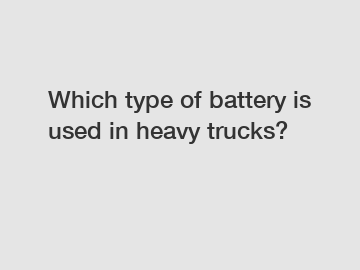Which type of battery is used in heavy trucks?
Which type of battery is used in heavy trucks? .
Heavy trucks are an essential part of our transportation infrastructure, enabling the movement of goods and services across vast distances. These powerful vehicles require a reliable and robust battery to support their operations. So, which type of battery is commonly used in heavy trucks? Let's explore this topic and shed light on the different types of batteries that power these mighty machines.
1. Lead-Acid Batteries: .

Lead-acid batteries have a long history of being used in heavy-duty applications, including trucks. These batteries consist of lead plates immersed in an electrolyte solution, usually sulfuric acid. They are known for their affordability, robustness, and ability to deliver high currents, making them suitable for the demanding energy needs of heavy trucks. Lead-acid batteries also have the advantage of being easily recyclable, which is crucial for reducing environmental impact.
2. Absorbent Glass Mat (AGM) Batteries: .
AGM batteries have become increasingly popular in recent years, including in heavy trucks. Similar to lead-acid batteries, AGM batteries utilize lead plates and an electrolyte solution. However, they feature glass fibers that absorb and retain the electrolyte, eliminating the need for a free-flowing liquid. AGM batteries offer several advantages over traditional lead-acid batteries, such as enhanced resistance to vibrations, improved deep-cycle capabilities, and a lower risk of electrolyte leakage.
3. Lithium-Ion Batteries: .
In recent years, lithium-ion (Li-ion) batteries have gained considerable attention as a viable alternative for heavy truck applications. Li-ion batteries provide several advantages, including a higher energy density, longer lifespan, and faster charging capabilities compared to lead-acid batteries. These qualities make them well-suited for heavy trucks that require a larger power supply and need quick charging to minimize downtime. However, the high cost of Li-ion batteries remains a significant factor impeding their widespread adoption in heavy truck applications.
4. Advanced Lead-Acid Batteries: .
Various advancements have been made in lead-acid battery technology, resulting in improved performance and durability. Enhanced flooded batteries (EFBs) and absorbed glass mat batteries (AGMs) are examples of advanced lead-acid batteries commonly used in heavy trucks. These advanced versions offer higher cycling capabilities, improved charge acceptance, and better resistance to deep discharges, making them well-suited for the demanding requirements of heavy truck applications.
5. The Importance of Proper Battery Maintenance: .
Irrespective of the type of battery used in heavy trucks, it is crucial to prioritize proper maintenance to ensure optimal performance and longevity. Regular inspections, cleaning terminals, and checking electrolyte levels are essential practices for battery upkeep. Additionally, avoiding deep discharges and keeping the battery charged at recommended levels will help extend its lifespan.
In conclusion, heavy trucks rely on different types of batteries to power their operations effectively. Lead-acid batteries, including advanced versions like AGMs and EFBs, have a long-standing history in this sector due to their robustness and affordability. However, the emergence of lithium-ion batteries provides an exciting potential alternative, with their superior energy density and fast charging capabilities. Nevertheless, the high cost of Li-ion batteries remains a barrier to widespread adoption. Regardless of the type chosen, regular battery maintenance is vital to ensure optimal performance and longevity. As technology continues to evolve, the future of heavy truck batteries holds great promise for improved efficiency and reliability.
Want more information on advantages of lithium-ion rv battery, camel generator, agm dual purpose battery for heavy truck? Feel free to contact us.

Comments